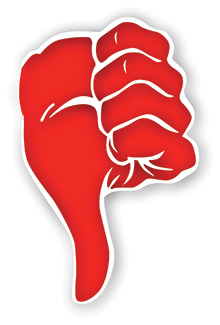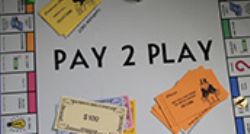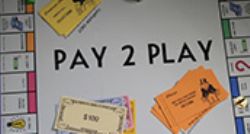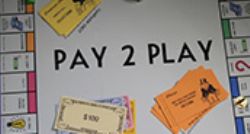| THE OVERALL MAP | THE PRO ARGUMENT | THE CON ARGUMENT | CONCLUSIONS TO PONDER |
 The CON Argument
The CON ArgumentDespite the growing number of artists that are paying to get on showcases and opening slots for major shows, there is still a large number of indie artists and like-minded business minds who believe the Pay 2 Play model is more damaging than it is helpful. They would argue that the promotional aspects of a show are solely the job of the promoter; and that the focus of the artist should be in creating an epic experience that makes that promotions company look good on their promise to the audience. Let's explore the various points of reasoning behind this logic.
The Quality of a Show Determines Value
Everyone can agree that a quality show from start to finish will always create a buzz and eventually help that show grow each time it delivers consistent quality entertainment. This is the most basic aspect of creating a successful show. Taking the time to choose artists who fit the theme of that night; a host that can carry the crowd in transitions; and a DJ that can keep the momentum moving throughout the evening is a science in itself that many take for granted. A truly professional artist is keen to this aspect of the business, and will strive to provide a quality performance that will help them gain a larger fan-base as well as more opportunities for further bookings.
With the Pay 2 Play model, the process of choosing talent based on themes or matching them to compliment the headliner is almost a lost art. The basis for choosing opening acts becomes based on money and influence; which rarely produces a quality production come performance time because anyone can save money and buy a stash of plays and twitter followers these days. The appearance of a following or the amount of money or people that an artist can bring into the building becomes the standard by which they are booked; and the performance aspect of the artist is often given little or no consideration.
This is a formula for mediocre showcases that gain the reputation for horrible opening acts, and result in the devaluation of opening slots because followers of the headliner start showing up late to shows in order to avoid the potential ear aches. As a result, tickets get harder to sell, new fan-bases are more difficult to gain and the desire for that slot eventually dwindles except for the bottom-feeding artists who don't mind throwing some drug money into it so they can jump on stage and "turn up" for their friends. Some would argue the Pay 2 Play model is partly the reason why shows with opening acts overall have decreased in popularity over the years.
The Value of the Performance
Those opposed to Pay 2 Play reference the need for a quality performance. As an artist, the value of the music in itself is important; but the value of the performance determines an artist's ability to convert a potential fan into a merchandise-buying follower. While an artist may be doing it for the love of their craft, their probability of surviving in a professional market is determined by their ability to sell their music through tickets, albums or other related merchandise. In order to do this, they need the space, time and focus to develop sets that will not only entertain the crowd, but encourage them to engage with the music personally. There's something REAL PERSONAL about music that makes fans want to spend money on it.
Currently, it is rare that promoters hold rehearsals, auditions or any practice sessions prior to the show. The addition of tickets sales or promotional work on the artists often overrides their time, and does not allow the artist to properly prepare themselves for a truly epic performance. This is one of the main arguments against Pay 2 Play, as it implies a preference towards those with money as opposed to great performers who can possibly create a lasting impact on a crowd that would result in an increased value to the promotion company's overall brand. If people knew that only quality acts were opening up or performing, the probability of future tickets sales will always grow and the opportunities for larger revenue streams from sponsors and vendors becomes more feasible. While promoters may argue that the time and effort it takes to build a brand this way is not worth it; advocates for artists and fans against Pay 2 Play claim that this create more longevity for everyone involved and foster business growth in the long run.
Redundancy is a Problem
With the overwhelming amount of artists in cities all over the globe, one would think redundancy would not be an issue at all when it comes to opening acts and showcases. The problem is that the few teams that have money through either legitimate or other means, are few and far in between. The exception are those artists who have a strong street team and can hustle a lot of tickets prior to the show. Those teams are even more of a rarity, and the result is the same artists opening up for every show, every time. Honestly, that's just boring!
Most times, promoters will follow the trends of that day and associate their business brand with being current on today's fashion, music and entertainment. The truly successful promoters have always been those who took chances, made risks and chose to create an experience that people would no easily forget. This takes a different approach to events and promotions, and focuses more on the production aspect as opposed to the popular trend of the week.
Merchandise, an Overlooked Necessity
There's a huge difference in perception when a show includes a merchandise area for products. It gives that show, the promotions team and the artists a more legitimate appearance to the crowd. There's something about having physical merchandise on a table set up with some forethought that gives a lasting impression on people. For those artists who do a lot of merchandise at shows, they will tell you that there is an art to a merch table that takes time and money in itself. Taking away from that is ignoring a whole revenue stream and perception that could eventually devalue the overall evening. It's a lost opportunity to build more fans, gain more loyalty and network with a targeted goal in mind. There's something about product that makes the effort and hustle that much more real.
With the advent of the internet hustle, Pay 2 Play productions have gotten away with not having to provide merchandise tables in the mindset that artists can easily distribute their twitter tags, websites and sell solely online. Artists and those against Pay 2 Play argue that this not only takes an opportunity for them to make money after putting on a great show, but that the money that they are putting into getting ON the showcase could be taking away from the merchandise they can create and sell. So, not only do they not get to sell merchandise, but they have less money to invest into making the merchandise to begin with.
To the truest artist at heart, the OVERALL PACKAGE, from the rehearsals, to the performance, to the table they will present merchandise on is a formula for success if done properly. Pay 2 Play inhibits these artists on ALL those levels, therefore, their commitment to Pay 2 Play models is minimal, and it leaves only those who fail to see the bigger picture. The results of this are too often seen in today's concerts that have declined in participation. People are tired of the throw-together shows and want quality entertainment. This is the outcry of those who oppose Pay 2 Play.



